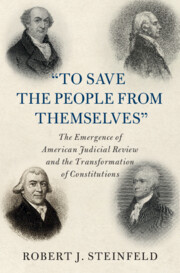 'To Save the People from Themselves'
'To Save the People from Themselves' Book contents
- “To Save the People from Themselves”
- Cambridge Historical Studies in American Law and Society
- “To Save the People from Themselves”
- Copyright page
- Dedication
- Contents
- Acknowledgments
- Introduction
- Part One Legislatures and Legislation under the First American Constitutions
- Part Two The Emergence of American Judicial Review: 1779–1787
- I The Emergence of American Judicial Review, 1779–1782
- 4 Supplementing Traditional Legislative “Revision” with Judicial Review: The New Jersey Case of Holmes v. Walton, 1779–1780
- 5 The Debate over Judicial Review in the Virginia Court of Appeals: The Case of the Prisoners, 1782
- II The Emergence of American Judicial Review, 1784–1787: Developing Judicial Review as a Check on Legislatures and on the People
- Part Three Judicial Review at the Federal Convention
- Index
5 - The Debate over Judicial Review in the Virginia Court of Appeals: The Case of the Prisoners, 1782
from I - The Emergence of American Judicial Review, 1779–1782
Published online by Cambridge University Press: 17 September 2021
- “To Save the People from Themselves”
- Cambridge Historical Studies in American Law and Society
- “To Save the People from Themselves”
- Copyright page
- Dedication
- Contents
- Acknowledgments
- Introduction
- Part One Legislatures and Legislation under the First American Constitutions
- Part Two The Emergence of American Judicial Review: 1779–1787
- I The Emergence of American Judicial Review, 1779–1782
- 4 Supplementing Traditional Legislative “Revision” with Judicial Review: The New Jersey Case of Holmes v. Walton, 1779–1780
- 5 The Debate over Judicial Review in the Virginia Court of Appeals: The Case of the Prisoners, 1782
- II The Emergence of American Judicial Review, 1784–1787: Developing Judicial Review as a Check on Legislatures and on the People
- Part Three Judicial Review at the Federal Convention
- Index
Summary
Commonwealth v. Caton (The Case of the Prisoners) also emerged from the turmoil of the Revolutionary war. During the spring and summer of 1781, the British army, which had operated in Virginia earlier in the war, invaded the state again. General William Phillips landed his troops, and marched to Petersburg, conducting raids as far west as Amelia. Benedict Arnold, having deserted the patriot cause and now serving as a British general, moved his troops up the James River, leaving a trail of destruction. General Cornwallis marched his large army into Virginia from the Carolinas, and dispatched Lieutenant Colonel Banastre Tarleton to try to capture Virginia’s legislature along with its governor, and they chased the governor and members of the General Assembly across the mountains, capturing seven. Thomas Jefferson, then serving his last months as Virginia’s governor narrowly escaped by fleeing from Monticello to his plantation at Poplar Forest in southwest Virginia.
- Type
- Chapter
- Information
- 'To Save the People from Themselves'The Emergence of American Judicial Review and the Transformation of Constitutions, pp. 175 - 214Publisher: Cambridge University PressPrint publication year: 2021
